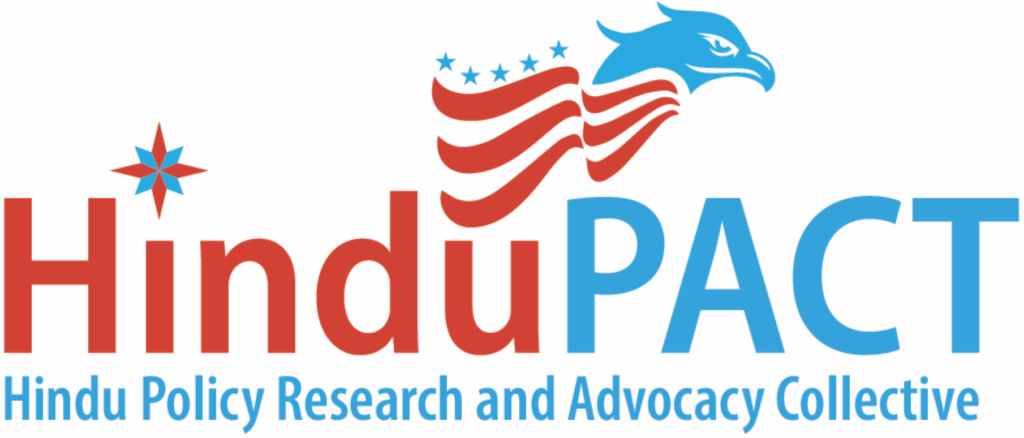FOR IMMEDIATE RELEASE
August 15, 2025
San Ramon, CA. American Hindus Against Defamation (AHAD), an initiative of HinduPACT, announced today the release of its comprehensive research report, “Tarnishing India, Targeting Hindus: The Global Weaponization of Transnational Narrative.” The report provides an evidence-based analysis that unequivocally refutes the widespread allegations of transnational repression (TNR) against India.
Ajay Shah, Executive Chair of HinduPACT, stated, “Our report unequivocally demonstrates that the transnational repression (TNR) narrative against India is a dangerous fabrication, unsupported by verifiable evidence and driven by ideologically motivated groups. To equate India, the world’s largest constitutional democracy, with robust judicial oversight, to authoritarian regimes notorious for extrajudicial actions, is not only analytically flawed but serves to undermine global democratic values.”
In stark contrast to the practices of authoritarian regimes like China, Russia, Iran, and Turkey, which have documented histories of assassinations, abductions, and covert coercion, India’s overseas actions are described as “legally authorized, procedurally proper, and fundamentally misrepresented” when categorized as repression. The report emphasizes that constitutional safeguards, administrative protocols, and judicial oversight mechanisms guide India’s counter-extremism measures.
The report asserts that the TNR narrative against India has been “propagated by a coalition of ideologically motivated NGOs, advocacy networks, and certain state actors”. These groups, identified as including the Indian American Muslim Council (IAMC), Hindus for Human Rights (HfHR), Sikh Coalition, and SALDEF, seek to delegitimize India’s global standing and sever the cultural and civilizational ties of the Hindu diaspora with their homeland.
Deepa Karthik, General Secretary of HinduPACT, highlighted the adverse consequences: “The weaponization of this TNR narrative has had a profound and chilling impact on Indian and Hindu diaspora communities worldwide. It fosters suspicion, fuels hate crimes and threatens to break our deep cultural and civilizational ties with our homeland. This report is an act of community self-preservation, defending the fundamental rights and identity of millions.”
The report highlights an increase in hate crimes and political marginalization experienced by the diaspora since these narratives gained traction. It lists vandalism against Hindu temples defaced with Khalistani slogans and shows a clear link between the TNR narrative and its effects on American Hindus.
HinduPACT has actively opposed California SB-509, a TNR bill. Deepti Mahajan, President of HinduPACT, emphasized that “SB-509, as written, functions like a Trojan Horse. Under the guise of community protection, it risks enabling profiling and discrimination against American Hindus, casting suspicion over our cultural and civic activities. It threatens to silence our voices in public life and discourage participation in the democratic processes that strengthen California. We urge elected officials to reject such politicized policy initiatives.”
HinduPACT urges elected representatives to adopt evidence-based policy and maintain rigorous evidentiary standards for TNR labeling, upholding legal reciprocity and avoiding politicized or selective oversight. The organization also calls for transparency in funding sources for TNR-related research and advocacy campaigns.
The report concludes that the “TNR narrative against India is a product of coordinated advocacy, ideological bias, and geopolitical strategy, rather than evidence,” and its propagation “threatens to undermine civil liberties, disrupt diaspora engagement, and erode the rights and cultural identity of Indian and Hindu communities abroad”.
About AHAD (American Hindus Against Defamation):
Established in 1997, AHAD stands as the pioneering Hindu movement globally dedicated to combating Hinduphobia and the denigration of Hindu scriptures, deities, icons, and cultural symbols across publications, mass media, and educational materials. AHAD leverages innovative AI methods to detect and counter Hindu hatred and ensure the sanctity of Hindu heritage. Visit https://ahadinfo.org
About HinduPACT:
The Hindu Policy Research and Advocacy Collective (HinduPACT) is dedicated to the advocacy and policy research of issues concerning the American Hindu community. HinduPACT promotes human rights, voter education, and policies affecting American Hindus, aiming for peace and understanding through informed policy initiatives and grassroots advocacy. Visit https://hindupact.org

